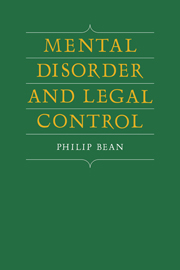Chapter 11 - Assessment and conclusion
from Section IV - Conclusion
Published online by Cambridge University Press: 06 July 2010
Summary
To repeat an earlier point: the 1983 Act is a piece of reforming legislation rather than a radical one. It seeks to amend, modify and update existing practices whilst retaining the basic philosophy established by the 1959 Act. It should be adjudged on that basis. Yet, in some respects, it is innovative; the consent procedures, for example, break new ground and the Mental Health Act Commission is new (albeit modelled on the Commissioners in Lunacy, established in the nineteenth century and their successors the Board of Control). Mostly it tidies up anomalies and attempts to provide detained patients with more rights without, of course, committing the government to a great deal of additional expenditure. Its major achievement is I think to create a new ethos, a new style and a more up-to-date approach. It also I think provides hope for the future, hope that patients will be recognised as people of some worth whose opinions matter or have to be considered, and hope too that mental health legislation will be updated along similar lines and with greater regularity.
I do not wish simply to add detailed criticisms to the failures of the legislation, for no Act of Parliament remains without criticism and no Act would be expected to include everything. Rather I wish to expand upon two or three topics which require further emphasis. Again, these are not intended to suggest priority but have been selected because they pose some of the most intractable sets of problems.
- Type
- Chapter
- Information
- Mental Disorder and Legal Control , pp. 187 - 195Publisher: Cambridge University PressPrint publication year: 1986



